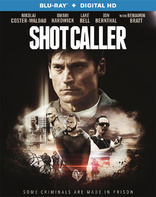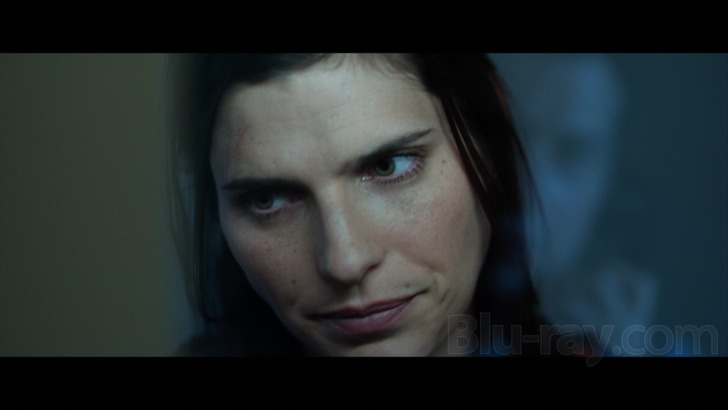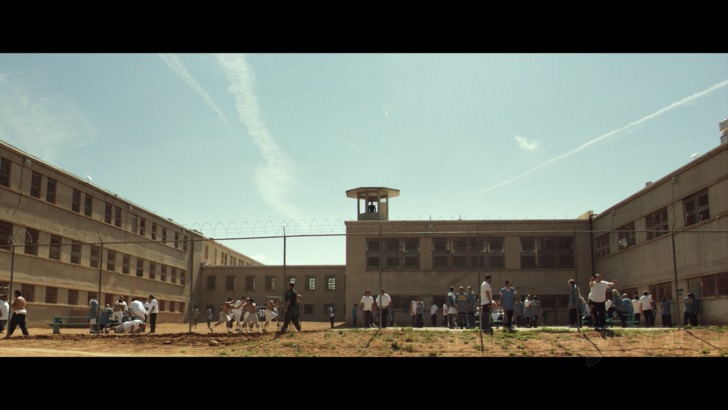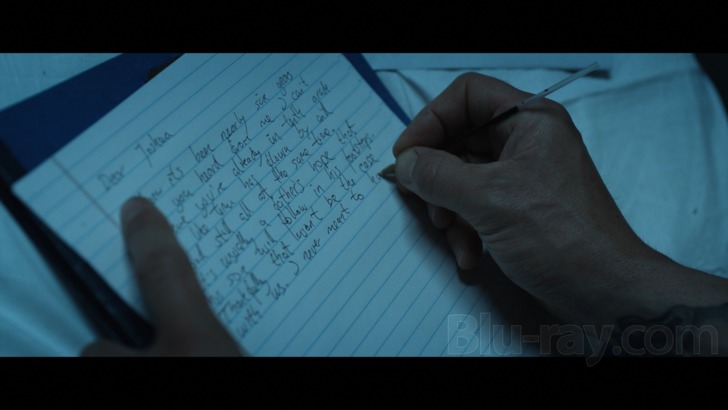Shot Caller Blu-ray Movie
HomeShot Caller Blu-ray Movie 
Blu-ray + UV Digital CopyLionsgate Films | 2017 | 121 min | Rated R | Oct 17, 2017

Movie rating
7.1 | / 10 |
Blu-ray rating
| Users | 0.0 | |
| Reviewer | 3.5 | |
| Overall | 3.5 |
Overview
Shot Caller (2017)
A newly released prison gangster is forced by the leaders of his gang to orchestrate a major crime with a brutal rival gang on the streets of Southern California.
Starring: Nikolaj Coster-Waldau, Lake Bell, Jon Bernthal, Omari Hardwick, Jeffrey DonovanDirector: Ric Roman Waugh
| Drama | Insignificant |
| Action | Insignificant |
Specifications
Video
Video codec: MPEG-4 AVC
Video resolution: 1080p
Aspect ratio: 2.40:1
Original aspect ratio: 2.39:1
Audio
English: DTS-HD Master Audio 5.1
Subtitles
English SDH, Spanish
Discs
Blu-ray Disc
Single disc (1 BD)
UV digital copy
Packaging
Slipcover in original pressing
Playback
Region A (C untested)
Review
Rating summary
| Movie | 3.5 | |
| Video | 4.5 | |
| Audio | 4.0 | |
| Extras | 1.0 | |
| Overall | 3.5 |
Shot Caller Blu-ray Movie Review
Reviewed by Jeffrey Kauffman October 18, 2017Though it’s largely forgotten today, in early 1972 a made for television movie which was on my radar because it had been shot in my then hometown of Salt Lake City was broadcast which created quite a critical furor, ultimately going on to receive a trio of Emmy nominations, including a win for director Tom Gries. The Glass House was based on a story by Truman Capote, and relayed the harrowing tale of an upper middle class college professor (Alan Alda, just a few months before he became a bonafide television star in M*A*S*H) who is convicted of manslaughter and who is sent to the slammer, being pretty spectacularly unprepared for the horrors which awaited him in the institutional life of a “modern” American prison. The Glass House has recurred kind of oddly throughout my life. I was a kid when it was shot in and around Salt Lake City (the prison itself is in Draper, somewhat south of Salt Lake), but for some reason the producers invited a lot of VIPs, among them my father, out to the Utah State Penitentiary (where Gary Gilmore was famously executed by a firing squad after The Glass House was produced) to see the filming and hobnob with the cast and crew. My Dad was completely unimpressed with the proceedings but dutifully reported everything he had seen and everyone he had met to his starry eyed son. Years later I weirdly ended up winning an eBay auction held by actor Kristoffer Tabori, who was a co-star in the film, which brought memories of this childhood event back to life. Now even more decades later, The Glass House rose from the dim mists of my memory again as I watched Shot Caller, since it deals with at least some of the same ideas and even some character “evolutions”, though I have to say as fascinating as the film often is, it’s perhaps too farfetched to resonate as strongly as The Glass House did for many back in the seventies. Shot Caller is, like The Glass House, built around the conceit of an upwardly mobile male, in this case Jacob Harlon (Nikolaj Coster-Waldau), who is convicted of involuntary manslaughter after he imbibes a few too many drinks and ends up in a fiery car crash that kills his best friend. Structurally, the film is quite interesting, beginning with scenes of Harlon, who has taken the nickname Money in stir, as a hardscrabble prisoner covered with tattoos and writing a note to his son. This introduction to Harlon (and/or Money, as the case may be) is intentionally misleading, since most audience members are going to assume they’re dealing with a “lowlife” who is probably a gang member and who deserves whatever fate he’s been handed. That disconnect between audience perception and “reality” may well be the most interesting thing about Shot Caller, a film that may simply be too outlandish for its own good, despite some really impressive performances from a large cast that also includes Lake Bell as Harlon’s ex-wife and Benjamin Bratt as Sheriff Sanchez, a lawman whose life intersects with Harlon’s (interestingly, The Glass House also profiled a guard who was, like Alda’s character, a newcomer to the prison).

While the structural artifice of Shot Caller is completely understandable, it may actually work against the feeling of reality the film is attempting to create, since there is such a huge disparity between Harlon and his ultimate identity as Money. Money is more or less a skinhead, with “skin art” documenting his belief in family (and race), and he’s obviously no one to mess with. That just doesn’t seem to jibe with a well to do suburbanite who is happily ensconced with a lovely wife and adorable young son. Of course part of the thesis proffered by writer-director Ric Roman Waugh (who considers this film a follow up of sorts to his Felon, which offers much the same basic plot and, yes, character “evolution”) is that the corrosive atmosphere of prison forces a basically good man to recreate himself as a street tough. Perhaps if Harlon hadn’t been quite so well to do this might have been an easier transition to document.
Because the central conceit of this decent and basically honorable man most definitely Breaking Bad (so to speak) may be a bit hard to swallow (as it was for me), linked subplots involving both what amounts to the schoolyard (i.e., prison) bully, the appropriately named Beast (Holt McCallany), as well as other elements involving Money's exploits as a free man with Shotgun (Jon Bernal) and Howie (Emory Cohen) may similarly strike some viewers as a little improbable. That said, this is a film with some absolutely blistering performances all around, and the subtextual angst that permeates the film is virtually palpable a lot of the time.
The disjunctive way Waugh lays out this tale is in and of itself an experience in feeling at least somewhat as askew as Harlon does in his new environment, and the film arguably waits too long to divulge some of the underlying reasons for the character’s transformation into Money. The brutalizing aspect of a life in prison is documented with pretty intense fury, and is brought home by a committed cast (which includes a lot of former felons as extras). There’s an almost startling veracity to the underlying story Waugh is telling, and there’s absolutely nothing amiss in Coster-Waldau’s accounting of his character’s choices, but the film’s reliance on a metamorphosis that may simply push the believability envelope a bit too far will probably determine how each individual reacts to the overall tale, and therefore will similarly determine how strongly this film will impact each individual viewer.
Shot Caller Blu-ray Movie, Video Quality 

Shot Caller is presented on Blu-ray courtesy of Lionsgate Films with an AVC encoded 1080p transfer in 2.40:1. Shot with a variety of digital cameras (according to the IMDb), this is a generally great looking transfer, one that offers excellent levels of fine detail even in some fairly dim situations. Director Ric Roman Waugh and cinematographer Dana Gonzales often favor extreme close-ups of faces, as can be seen in several of the screenshots accompanying this review, an approach that supports nice fine detail levels. There are a few passing shots in the darkest bowels of the pen where detail levels may falter a bit (see screenshot 8), but overall the palette is robust and natural looking (aside from some brief grading choices).
Shot Caller Blu-ray Movie, Audio Quality 

Some coming to Shot Caller expecting more of a traditional action adventure outing or even a thriller may be slightly disappointed with the DTS-HD Master Audio 5.1 mix, since it doesn't offer a glut of elements like things going bang and the like. Instead, there's a really nice and quite nuanced accounting of the "industrial hum" (as the commentary terms it) of the prison setting, as well as more raucous moments like skirmishes that break out in the prison yard from time to time. Surround activity may be subtle at times, but it's generally fairly consistent, placing quite a few ambient environmental effects around the side and rear channels. Dialogue is rendered cleanly and clearly on this problem free track.
Shot Caller Blu-ray Movie, Special Features and Extras 

- Filmmaker Commentary features director Ric Roman Waugh and cinematographer Dana Gonzales.
- Inside Job (1080p; 18:45) features some good interviews and some interesting information about the abandoned penitentiary in New Mexico where the film was shot.
Shot Caller Blu-ray Movie, Overall Score and Recommendation 

For me personally Shot Caller was a near miss. A lot about this film is very impressive, but I just couldn't quite get past my incredulity over the transformation experienced by this one upstanding member of society. Yes, it's probably decently "explained", ultimately at least, that is, if you buy the fact that the explanation is attempting to rationalize what is by any measure a pretty startling metamorphosis. Performances are very strong and technical merits are excellent. Recommended.
Similar titles
Similar titles you might also like

Mandela: Long Walk to Freedom
2013

Black and Blue
2019

Steve Jobs: The Man in the Machine
2015

Loving Pablo
2017

Papillon
2017

The Mustang
2019

Just Mercy
2019

Son of a Gun
2014

Brubaker
1980

Adopt a Highway
2019

Gotti
2018

Room
2015

The Founder
2016

Rosewater
2014

Fruitvale Station
2013

The Wave
Bølgen
2015

A Prayer Before Dawn
2017

Ava
2020

No Escape
2015

White Boy Rick
2018